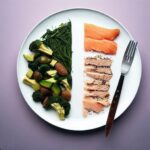Low carb diets are often in the news.
But is the idea of a high protein, low carbohydrate, diet a healthy option for you?
Should we be eating a diet that’s low in carbohydrates but high in protein and (often) high in fat?
Despite all the relatively recent publicity, low carb diets have been around for a long time.
 Way back in 1863, William Banting wrote his Letter of Corpulence which talked about his lack of success with most diet plans which despite being written over 150 years ago will sound familiar to any modern dieter:
Way back in 1863, William Banting wrote his Letter of Corpulence which talked about his lack of success with most diet plans which despite being written over 150 years ago will sound familiar to any modern dieter:
- Fasting
- All sorts of diets
- Spa and exercise regimes
And – much like most modern dieters – Banting found that those near enough only worked in theory, not in real life.
Then, on the advice of his doctor, he started to follow a different diet.
He was allowed 4 meals a day.
Each meal had:
- Meat
- Greens
- Fruit
- Dry wine (that’s a nice thought for a diet meal!)
And he had to avoid:
- Sugar
- Saccharine (I didn’t know that was around 150 years ago)
- Starch – those potatoes and grains we hear so much about
- Beer
- Milk and butter
So Banting wasn’t a particularly high fat low carb diet but it was definitely high protein with meat at every meal.
The pamphlet sold well – three editions were printed, going from being self published (yes, that was around in the 1800’s, well before Amazon brought it to the masses) to having an established publishing house take over production once it proved popular (some things don’t change in publishing).
It’s still available today although I haven’t personally read it.
And, much like modern low carb diets such as the Atkins diet there were false rumours spread about it being unhealthy and that it destroyed people’s health.
Almost identical to the rumours and other bad press that surrounded the Atkins diet over a hundred years later.
Which is all good background reading but it doesn’t answer the initial question of whether or not a high protein, low carb, diet is a healthy option.
Keep in mind that I’m not medically qualified so if you’re unsure about a diet you should consult your doctor or a similarly qualified health practitioner.
But the studies I’ve read strongly suggest that the answer to the question is “yes”.
It’s generally accepted that our ancestors didn’t have a carb-rich diet. Simply because the available food wasn’t high in carbohydrates.
We’ve only been cultivating potatoes for at most the last 10,000 years. Rice about the same length of time.
We’ve been eating wheat for about 7,000 years.
And things like corn have only been in our diet for about 1,200 years.
Whilst even the smallest of those figures seems a long time, in evolutionary terms they’re not significant.
Which explains a lot about all the allergies and food intolerances people have – we’re simply not adapted to a high carb diet.
Despite how it looks when you walk into a supermarket.
And despite how tempting all those carbs are.
Prior to agriculture, we’d have been hunter gatherers.
If our food didn’t walk, slither, fly, swim or grow out of the ground, chances are we would never have encountered it.
So our bodies wouldn’t know how to best consume it.
There’s no evolutionary advantage to adapting to food that effectively doesn’t exist!
On that basis alone, a low carb diet is probably the best one for most humans.
We were intelligent enough to know that in the 19th century when it was standard treatment for diabetes.
But, like so many things, we tend to think that we know better and can ignore what’s worked for hundreds or even thousands of years.
The high protein side of a low carb diet is a bit more contentious.
Chances our that our ancestors wouldn’t catch something to eat every day.
Maybe they would if they were near a river or the coast – fish are nowhere near as sneaky as animals when it comes to avoiding capture.
But any of our ancestors who lived inland probably wouldn’t have had a particularly high protein diet.
That said, when protein did arrive, they’d probably have eaten a decent quantity of it.
Meat goes off.
So whatever got killed today probably got eaten today, maybe with a bit left over for tomorrow if it was a really large creature.
In my mind, that means it stands to reason that we are genetically designed to cope with high amounts of protein in our diet, even if those high amounts are a lot more regular nowadays than they were when we’d only have had protein if our prowess with a spear was good enough.
The other thing that (for me at least) stands out in favour of high protein low carb are the statistics that happen in our bodies when we follow that kind of diet.
It’s by no means unheard of for diabetes to be controlled or even put in abeyance when a strict low carb diet is followed.
It’s easy to check your own blood pressure using a cheap device that’s surprisingly accurate and often also stores your previous readings if you want it to.
There are kits or tests to check other vital measurements.
And, of course, there’s the other test of stepping on a set of scales on a regular basis.
Modern scales measure your weight – as you’d expect – but quite a few also do their best to guess your fat and water percentage.
The figures aren’t 100% accurate because they’re based on quite a few assumptions that may not be totally correct for you. But they’re definitely good enough for monitoring how well your body is coping with a high protein, low carb, diet.
You could run a test on yourself – cut down on the carbs for a month, weigh yourself at least once a week, take your blood pressure measurements regularly.
Jot all the figures down on a pad or a spreadsheet – you won’t remember them all at the end of the test.
Don’t calorie count.
Just carb count.
Or – even easier – just cut out the obvious high carb things like potatoes (even those tempting fries!), bread, rice, beer (sorry) and anything high sugar.
That can mean you need to read the ingredients a bit more than you normally do. But that’s easy enough to do, especially when it means you could be living a longer, healthier life.
At the end of your month’s experiment, chances are a few things will have happened.
You won’t have felt anywhere near as hungry as you first thought. Sure, carbs fill us up but so does protein or a dish with lots of healthy veg.
You won’t have felt as tired after lunch because your body won’t be dealing with all the sugar and carbs you used to feed it.
There’s a good chance you’ll do the same as Banting did and shed some weight.
Which is a very nice feeling for most of us.
And there’s also a very good chance you’ll feel better overall.
Check out more here about high protein low carb dieting.










